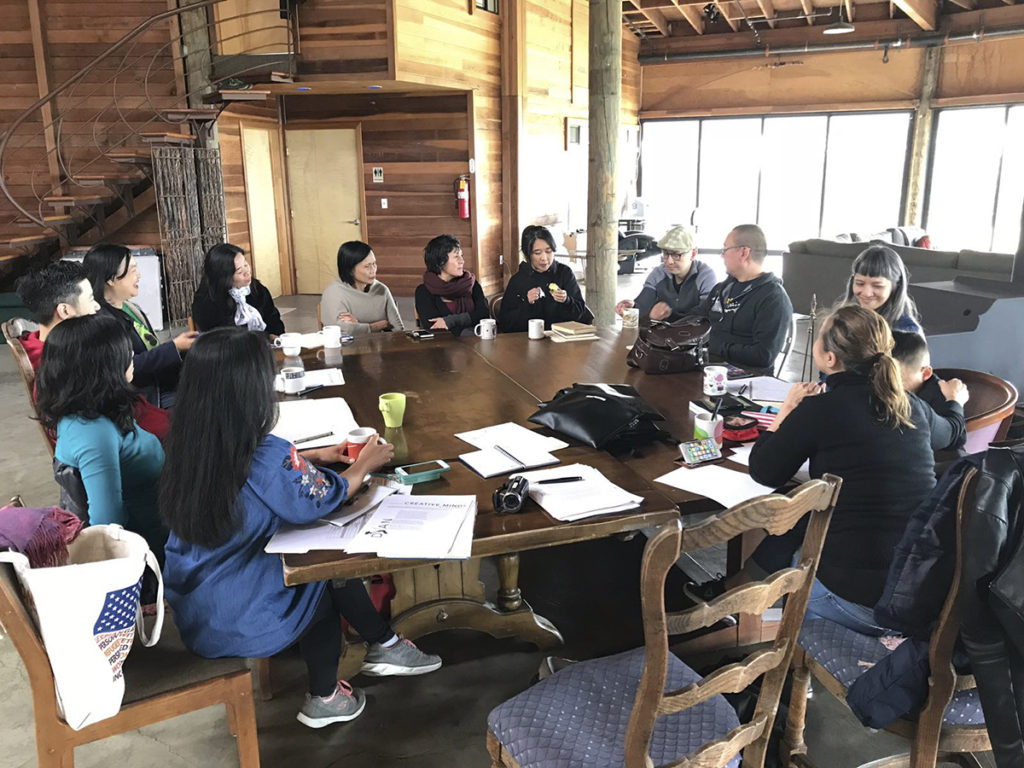Vanessa Hua

As fog hovered over the coast and winds blew hard along the ridge in the hills of Woodside, novelists Anna Moï and Aimee Phan settled in for a conversation that spanned decades, continents and families.
“How does France get into the picture for you?” Moï was asking Phan about her first name, and her novel, “The Reeducation of Cherry Truong,” which includes scenes in France.
“My parents both spoke French, and went to French schools, and France became a more idealized version of what their lives would have been if we had immigrated there,” mused Phan, who was born and raised in the United States and now lives in Berkeley. “Where I write from is my way of getting close to France, to the places that were most important to my family. They felt this yearning, ‘Where are we going to find a place to feel at home?’ — and eventually, where they felt most at home was in California.”
Moï, born in Vietnam and now living in France, told a story about the impossibility of return. Her elderly father settled in Orange County, and after more than 37 years, decided to go back to Vietnam. He left after three years. “The homeland is where the taste buds are, and he was happy to be in California and get his bowl of pho,” Moï said.
They were among the two dozen or so writers of Vietnamese descent hailing from California, Oregon, New York, Minnesota, Australia, Canada, France and Indonesia — who converged this week on the Djerassi Resident Artists Program’s ranch, a cluster of buildings set in 583 bucolic acres of coastal grasslands and redwoods.
The retreat — organized by the Diasporic Vietnamese Artists Network, founded by Viet Thanh Nguyen, Pulitzer Prize-winning author, and Isabelle Thuy Pelaud, a professor of Asian Americans Studies at San Francisco State University — aims to move the voices of writers from diaspora from the margins and into the center.
People all over the world have seen American movies about the Vietnam War or read American novels about the war, but very few have read a Vietnamese book, and almost none has seen a Vietnamese movie, they say. The challenge for Vietnamese people is to get Americans to understand that their country is more than a war.
In the aftermath of the war, many families ended up separated, scattered and settling across the globe. And so, the impact of war and race may vary for them depending on their host country’s history with Vietnam, as well as its relationship with immigrants of color.
On the first day of the retreat, as the cook set a pot to boil, Phan and Moï talked about their childhoods, and how that influenced their parenting styles. “I raised them as a French person, not a Vietnamese person,” Moï said, sitting with Phan at the cozy dining room table.
Their conversation will become part of an anthology that reflects the humanity, diversity and complexities of refugees and immigrants of color and also responds to rising antirefugee sentiments in the U.S. and Europe. Others attending the retreat include Thi Bui, Nam Le, Bao Phi, Dao Strom, Monique Truong, Nguyen Phan Que Mai, Hoa Nguyen, Anh Thang Dao and Lan Duong.
As a student at UC Berkeley in the mid-1990s, Nguyen said, he and Pelaud formed a group called “Ink and Blood” to promote the work of Vietnamese American writers, poets and visual artists. The Diasporic Vietnamese Artists Network, founded in 2007, continues that mission, and the retreat was a chance for many of the writers to meet in person for the first time.
“My accent — there is no space for someone like me unless I created one,” said Pelaud, born and raised in France before coming to the United States as a teenager.
With a beaming smile, she welcomed writers as they started arriving. So often, at conferences, there may be no other or only a handful of Vietnamese in attendance. “It’s wonderful to feel like we belong, and that we are not the token, the Other,” she said.
Nguyen Phan Que Mai, who’d just flown in from Jakarta, woke up from a nap minutes before the orientation in the converted barn, where the floor-to-ceiling windows looked out onto hawks floating on updrafts.
“Writers have a lonely life, and I want to listen and learn here,” said Nguyen, a Vietnamese writer whose first novel written in English, “The Mountains Sing,” will be published next year.
The retreat will culminate with a sold-out reading on Saturday, June 9, at the San Jose Museum of Art. For more information about the Djerassi program, go to http://djerassi.org.
Vanessa Hua is a Bay Area author. Her columns appear Fridays in Datebook. Email: [email protected]


